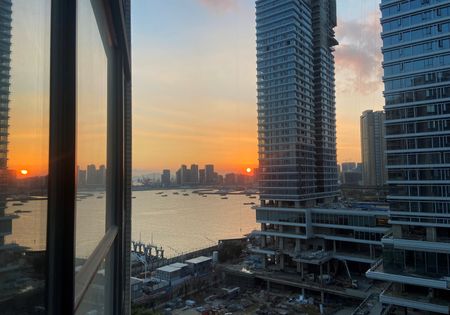 1
1 1
1

By Liangping Gao and Ryan Woo
BEIJING (Reuters) – China’s property market woes are likely to worsen this year with prices remaining flat and sales and investment falling further, while tighter and widespread COVID-19 curbs weigh on still fragile demand despite more policy easing.
The property market, a pillar of the world’s second-largest economy, was weakened by a government clampdown on excessive borrowing from developers last year.
Since the beginning of this year, over 100 cities have taken steps to boost demand via cuts in mortgage rates, smaller down-payments, and subsidies.
The outlook for the property market is expected to remain bleak in the first half of the year and for the whole of 2022.
Average home prices are estimated to fall 1.3% on year in the first half, according to a Reuters survey of 13 analysts and economists conducted between May 16 and May 23. That compared with a 1.0% fall in a Reuters poll in February .
For the full year, home prices are likely to be flat versus a forecast 2.0% rise in the previous poll.
“The current national housing inventory is in a high phase, and tier-three and four cities face large de-stocking pressure” due to demand slowing, said analyst Ma Hong at Zhixin Investment Research Institute.
“The turning point of home prices is likely to be in the third quarter, and home prices in tier-one and two cities may be the first to rebound.”
Analysts are also more pessimistic about housing demand and supply than in the last Reuters survey.
For demand, property sales are seen slumping 25.0% in the first half, widening from a 14.0% fall in February’s poll. Sales are expected to decline 10.0% for the full year.
Investment by real estate firms is expected to fall 5.0% in the first half and drop 2.5% for the whole year. Analysts previously forecast investment would drop 2.0% in the first half and gain 1.5% in 2022.
The gloomy outlook for property prices, sales, and investment was mainly due to frequent COVID-19 outbreaks.
The Chinese capital Beijing extended work-from-home guidance for many of its 22 million residents after the suspension of all dine-in services and indoor gyms, while Shanghai plans to lift a two-month lockdown in the first half of June.
The epidemic has had an impact on Shanghai’s property market, as developers and agents suspended offline operations and many residents were under quarantine, triggering a big fall in home sales, said analyst Wang Xiaoqiang at property data provider Zhuge House Hunter.
China on Friday reduced its benchmark reference rate for mortgages by an unexpectedly wide margin, a few days after a cut in mortgage loan interest rates for some home buyers, in a push to prop up its property market.
Analysts said authorities should introduce more policies targeting the supply side to restore market confidence.
Only nationwide measures to relax curbs on financing for real estate enterprises and steps like shantytown redevelopment projects can stabilise the property market, said Liu Yuan, a head of research at China’s biggest property brokerage Centaline.
(For other stories from the Reuters quarterly housing market polls:)
(Reporting by Liangping Gao and Ryan Woo; Additional Reporting by Shuyan Wang and Jenny Su; Editing by Sonali Desai)